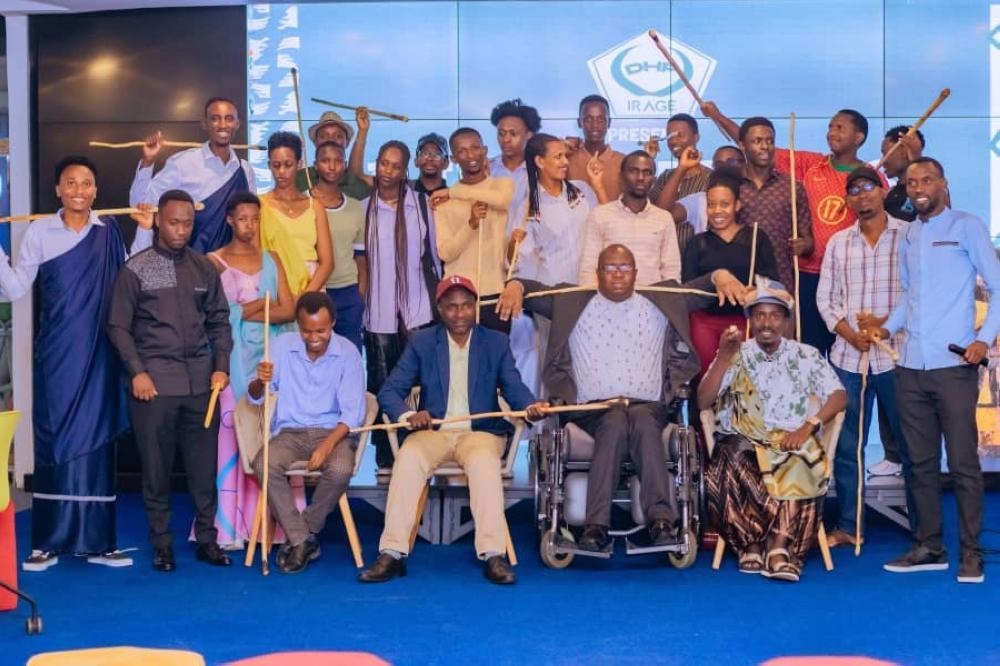Africa-Press – Rwanda. The government’s efforts to preserve and promote its cultural heritage have entered the digital era, thanks to a group of young innovators developing a prototype platform to make the country’s museums and heritage assets accessible online.
The initiative, known as the Digital Heritage Preservationists (DHP) platform or Urubuga Ndangamurage–IRAGE aims to allow anyone to explore Rwanda’s culture and history with a simple click.
Leading this transformation is Elisha Clever Rukundo, Founder and CEO of the Digital Heritage Preservationists (DHP) platform, a flagship initiative of Irage Corporation, a Pan-African cultural innovation enterprise headquartered in Rwanda.
“Some young people have heroism within them. We’re working hard to prove it, and that’s why we’re planning to launch it on February 1 next year,” he said. “Two out of three models have been completed. We’re finalising the e-learning component and adding key contents.”
Rukundo, 31, is one of the 80 graduates of the Rwanda Heritage Hub (RHH)’s first cohort in 2024, representing a new generation of digital cultural guardians. RHH was a two-year program dedicated to nurturing young Rwandans passionate about safeguarding and reimagining the country’s cultural heritage.
Rukundo says the idea for Irage was born out of a simple observation – most people rarely visit museums physically, yet they are highly active online.
“After the 1994 Genocide against the Tutsi, the government made efforts to restore much of our heritage that had been scattered or replaced by colonial structures,” he explained.
“However, these sites remain under-visited, especially by young people. I felt a responsibility to bring them closer through digital access,” he said.
What will DHP offer?
The Irage platform will provide a virtual bridge between cultural enthusiasts, learners, and museums across Rwanda. It is built around three main components.
Digital access to artifacts and archives
The platform will feature audio, visual, and photographic archives from various museums, offering users access to Rwanda’s cultural and historical treasures.
From royal artifacts and traditional tools to ancient art and colonial-era exhibits, Irage will allow anyone, anywhere, to explore Rwanda’s history online.
Cultural marketplace
Beyond information, Irage will provide a space for artisans to showcase and sell traditional crafts.
“We designed a market category where heritage creators earn income while promoting culture,” Rukundo said.
This includes items such as Inkoni – traditional Rwandan walking sticks symbolizing authority and respect. Agaseke – handwoven peace baskets representing unity and love, Igisoro – traditional wooden board game symbolising wisdom and strategy, Imyambaro y’Ubukwe – traditional wedding attire showing elegance and pride, Intango – wooden milk containers symbolizing purity and hospitality and many others.
These artifacts, now digitised and available for purchase or viewing, preserve Rwandan craftsmanship while supporting livelihoods.
E-learning and cultural education
The platform will also feature educational materials, language lessons, and detailed descriptions of heritage items — helping users understand the meaning, use, and stories behind each artifact.
“We aim to create jobs and instill pride in our identity,” he said. “This heritage belongs to us and the next generations. Everyone has a role to play.”
Working hand in hand with cultural body
Rukundo acknowledges the strong collaboration with the Rwanda Cultural Heritage Academy (RCHA), which oversees the protection and management of cultural artifacts and museums.
Together, they will ensure that Irage’s content aligns with Rwanda’s broader goal of decolonising museums and reframing narratives that were once told through a colonial lens.
“Many of our artifacts were misrepresented as foreign discoveries,” he said. “It’s time we tell our own stories, truthfully and proudly.”
Despite Rwanda’s progress in reclaiming its heritage, cultural officials estimate that over 90 per cent of Rwanda’s historical artifacts remain in European museums. Negotiations continue for their return, though in many cases, only digital or replica copies are shared.
Museums you can visit virtually
Through Irage, users will explore several of Rwanda’s key museums from their devices. However, the model is not yet fully set.
“The virtual tour is currently in demonstration mode, and the technical setups are complete. On November 10, we’ll meet with the cultural body to discuss how to gain access and begin virtualizing all the museums. Both data collection and dissemination will be completed before January, and the launch will take place in February,” he explained.
Once complete, visitors will be able to access key museums such as Kandt House Museum (Kigali) – former home of Richard Kandt, Germany’s first colonial governor, now showcases Rwanda’s life before, during, and after colonial rule.
Rwanda Art Museum, once the Presidential Palace now hosts contemporary artworks from Rwanda and abroad, celebrating local creativity.
Kigali Genocide Memorial – the resting place of over 250,000 victims of the 1994 Genocide against the Tutsi, serving as both a memorial and an educational center.
The Ethnographic Museum located in Huye District was gifted by Belgium’s King Baudouin in the 1980s, this museum holds one of Africa’s richest ethnographic collections.
King’s Palace Museum located in Nyanza District is a reconstruction of the traditional royal residence, complete with the famous long-horned Inyambo cattle tended by royal herders.
The platform also documents historical events such as the Ndungutse Rebellion, the Conquest of Rwanda, and the Rucunshu Coup, key episodes that shaped Rwanda’s political and social evolution.
With Irage.rw, Rukundo and his peers hope to make Rwanda’s heritage more accessible, interactive, and inspiring, particularly for young people.
“Our culture shouldn’t just live in archives or behind museum walls,” he said. “It should live in our devices, our art, our conversations, and our hearts.”
For More News And Analysis About Rwanda Follow Africa-Press






